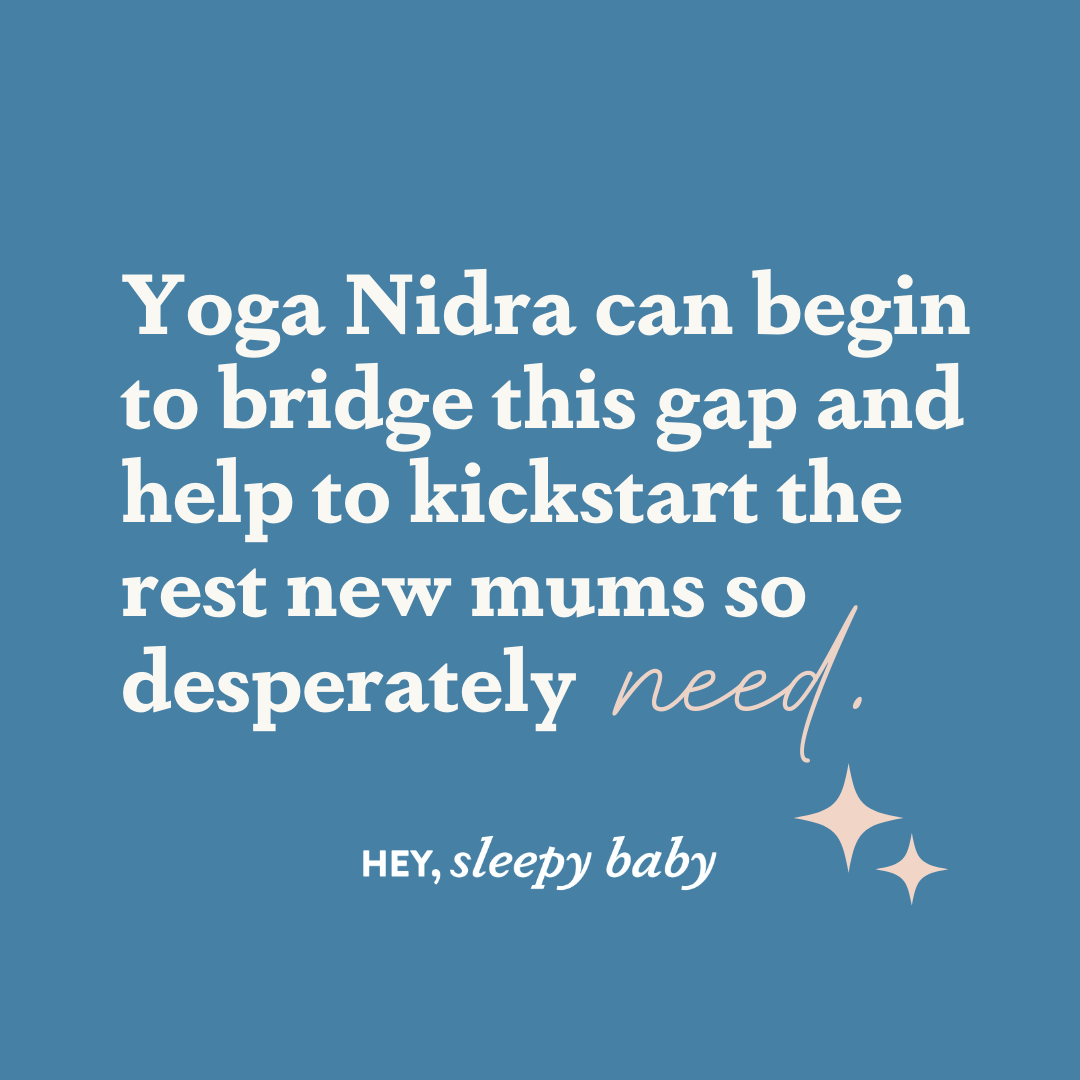How to use Yoga Nidra to help with PostPartum Depression, Anxiety, Insomnia, and Sleep Deprivation
The postpartum period and the first year of motherhood are gruelling for one’s sleep. Sleep deprivation is something you can’t prepare for. Although as a society we joke about it or scare new mums with taunts of ‘you will never sleep again’, we aren’t having open discussions about how to care for yourself during this period to help you through it. We don’t talk about the effects sleep deprivation can have on mental health, postpartum anxiety, postpartum depression, postpartum insomnia, etc, and if we do dare to have the conversation the immediate narrative is to sleep train your baby, and if you haven’t or aren’t prepared too well then it’s your fault you are feeling the way you are. This is the beginning of that discussion and a snippet of advice as to how to use Yoga Nidra to help nurture yourself through this season.
Yoga Nidra is a Sanskrit term meaning yogic sleep, it is a deep relaxation technique and a form of meditation. Through guided meditation the practitioner enters a state of conscious relaxation, a state of dreamless sleep. As the body relaxes brain activity is reduced and the body and mind enter a healing state. The awareness is moved from the external world to the inner world and then into deep relaxation. The benefits of this practice are huge. Allowing the body to relax in this way helps to lower stress, rejuvenate your energy, and practice the art of entering a state of relaxation and moving between different levels of consciousness. It is said that one hour of Yoga Nidra can be the equivalent of four hours of normal sleep. Simply put in this state of conscious relaxation you can switch off the sympathetic nervous system (fight/flight) and switch on the healing qualities of the parasympathetic nervous system (rest/digest).
So how can this be of benefit? The narrative of ‘sleep when the baby sleeps’ is well versed in society but this can put undue pressure on mums. Often our brains are so active holding the mental load of motherhood, weathering the postpartum hormone changes, running the household, etc that it can be increasingly hard to fall asleep when the baby naps and the feelings of needing to get things done can be loud and intrusive on the very real need to rest. I’m sure this sounds all too familiar to mums! Maternal burnout during the postpartum period is high and google analytics shows us that people are increasingly searching for self-care for new mums, postpartum care, postpartum depression, and postpartum anxiety.
Yoga Nidra can begin to bridge this gap and help to kickstart the rest new mums so desperately need. There is a multitude of guided Yoga Nidra videos on youtube. These range from 15 minutes to 2 plus hours. During my postpartum journey, I found 20-minute yoga Nidra videos incredibly helpful for restoration and relaxation. I could listen to these if I was contact napping, if my baby was napping alone or I could listen in the evening for 20 minutes. I felt like I was getting a nap, a meditation, and a mothering voice in just 20 minutes. Even when my baby would do the dreaded cat nap I still had time to complete a Yoga Nidra and feel rested. It felt luxurious when the rest of my day felt fraught! When I was at my lowest point with sleep deprivation I felt completely consumed by where to start with self-care for new mums. I was struggling with postpartum anxiety and depression and making decisions was exhausting. My motivation to complete an active yoga session when all I wanted to do was watch Netflix and do nothing was low but I knew that my mind and body needed some TLC and whilst Netflix was allowing me to do nothing it also wasn’t adding anything. Finding the motivation to lie and do nothing but listen to a guided voice tell me soothing things didn’t require much motivation and I felt great afterward. They can be done anywhere, a bed, a chair, the floor, etc. A further benefit of Yoga Nidra and who doesn’t love something short and jam-packed with benefits, is that guided Yoga Nidra’s are full of the types of affirmations that help to stave off intrusive thoughts that are so linked with postpartum depression and anxiety.
Often when we feel intensely sleep deprived we can hyperfocus on sleep itself. This pressure can lead to insomnia. Our body needs to feel safe and relaxed before it can fall asleep and if we are anxiously trying to force our body to sleep we are not in a conducive state for relaxation to happen. Many new mums report lying in bed thinking about all the things they need to do tomorrow, analyzing the day, and having swirling thoughts that leave them awake until the early hours. This then has a knock-on effect and as this builds up maternal mental health can take a nose dive. Insomnia can worsen over time, again a concept that increases pressure on the need to sleep. Yoga Nidra can break this pattern by taking the pressure of sleeping but reminding your body how to enter a state of relaxation. My anxiety around falling asleep, the quality of my sleep, and the length of sleep has greatly reduced since having a regular Yoga Nidra Practice.
My personal favorites were those by Melissa West but as with any yoga and meditation, you will find the one that suits you. Here are my top three:
Yoga Nidra for Exhaustion | Yoga with Melissa West 456 - YouTube
Yoga Nidra for Healing 20 mins | Yoga with Dr. Melissa West 438 - YouTube
20 Min Yoga Nidra for Deep Rest | Yoga with Melissa 593 - YouTube
With the rise in women’s voices globally hopefully, the narrative around postpartum health is changing, and with that, I hope awareness of how to nurture, soothe and protect new mums is growing – I believe Yoga Nidra can be a useful tool to aid this process.




